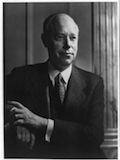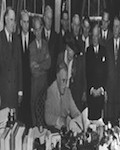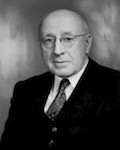U.S. Senator Robert A. Taft (1889-1953), Republican of Ohio, played a leading role in congressional initiatives promoting the rescue of Jewish refugees and the creation of a Jewish state.
Taft opposed the 1939 Wagner-Rogers bill to admit 20,000 German Jewish refugee children, arguing that the United States was already doing its share to address the refugee problem. In 1943, however, Taft became one of the lead sponsors of the Gillette-Rogers resolution that called for establishment of a U.S. government rescue agency. As chairman of the resolutions committee of the 1944 Republican national convention, Taft helped ensure that the GOP platform included a plank calling for the rescue of Europe’s Jews and the creation of a Jewish commonwealth in Palestine.
Taft’s interest in Zionism was strongly influenced by his close longtime relationship with Rabbi Abba Hillel Silver of Cleveland. The fact that Taft was generally suspicious of Great Britain, and opposed U.S. aid to England prior to America’s entry into World War II, likely facilitated his opposition to British rule in Palestine.
At Silver’s urging, Taft and a Democratic colleague, Senator Robert Wagner of New York, in January 1944 introduced a resolution calling on the British to open the doors of Palestine to refugees and permit establishment of “a free and democratic Jewish commonwealth” there. Concerned that the resolution would anger the Arab world, President Roosevelt had the War Department inform Congress that the measure “would be prejudicial to the successful prosecution of the war.” As a result, the Taft-Wagner resolution was shelved.
To avoid a conflict with Jewish leaders, the president refrained from his articulating his opposition to the resolution. After a meeting with Rabbi Silver and Rabbi Stephen Wise in March 1944, FDR told the cabinet that he had reprimanded Silver for “doing a very reprehensible thing when you spread rumors around Washington that I, the president, am responsible for the War Department’s position…” Roosevelt then turned to Secretary of War Henry Stimson and said, “I hope you don’t mind my hiding behind your skirts.” It was not until December 1945, after FDR’s passing and the conclusion of World War II, that the resolution was finally adopted.
Sources: Wyman, The Abandonment of the Jews, pp.194-203; Penkower, The Holocaust and Israel Reborn, pp.132-133; Wentling and Medoff, Herbert Hoover and the Jews, pp.128-133.











